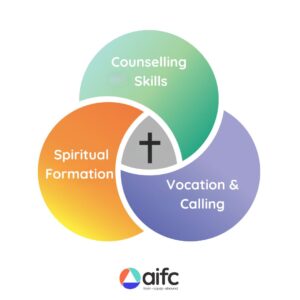As demand for mental health support continues to rise, how we train counsellors has never been more critical. At aifc, we believe the most powerful learning happens when theory meets practice, when students don’t just learn about counselling, but become counsellors through doing. That’s the heart of vocational education and training (VET).
Counselling is not a purely academic discipline—it’s relational, reflective, and deeply practical. And that’s exactly why a vocational education pathway provides such a strong foundation for those called to this profession.
Learning Counselling by Doing Counselling
Counselling skills can’t be mastered by textbooks alone. They are shaped through:
- Practice – engaging in real or simulated counselling sessions
- Feedback – receiving constructive input from experienced professionals
- Reflection – developing insight through supervision and peer discussion
This kind of applied learning is at the core of vocational education. At aifc, students participate in live roleplays, case studies, and practical placements—developing confidence and competence through real-world experience.
During our industry consultations, clinical supervisors and employers consistently affirmed that aifc students thrive in environments that are practical, relational, and feedback-rich. One clinical supervisor noted,
“We see a noticeable difference in students who come from a vocational background, especially from aifc. They’re more confident, more prepared, and they engage with clients from day one with real professionalism and care.”
Employers also highlighted that aifc graduates often demonstrate a stronger sense of purpose, clearer ethical boundaries, and greater readiness for client work, particularly in their early professional years. This hands-on, transformational approach to learning is one of the key reasons they’re sought after in both private and organisational settings.
VET Pathways Are Now Stronger Than Ever
The Australian Universities Accord has called for stronger, more connected pathways between vocational and higher education. It recognises that VET plays a critical role in building Australia’s future workforce—and that clearly supported transitions into higher education should be a national priority.
This reflects aifc’s own model, where students can:
- Begin with the nationally accredited CHC51015 Diploma of Counselling
- Progress to the 11207NAT Advanced Diploma of Integrative Practice (Counselling)
- Transition into the 10900NAT Graduate Diploma of Counselling (Christian)
- Continue to postgraduate study through credit pathways into a Master of Counselling.
These pathways are designed to support students at every stage—whether they’re entering the field, upskilling, or seeking advanced recognition.
What the Research Shows
Broader research and national trends continue to affirm the strength of vocational education:
- Strong employment outcomes – VET graduates often enter the workforce sooner, with high employment rates. Counselling students gain practical experience during their study through placement and practice hours.
- Higher satisfaction among adult learners – VET offers flexibility, smaller cohorts, and real-world relevance—factors many students prefer over traditional university formats.
- Industry-led education – Vocational training is aligned with workforce needs. In counselling, this means education that reflects current ethical standards, real client issues, and contemporary practice settings.
- Practical training = readiness – Employers want counsellors who are ready to practise from day one. VET delivers this by embedding skill development and placement into every stage of the journey.
The aifc Difference: Formation that Fuels Transformation
At aifc, we believe you can’t lead others toward healing unless you’ve experienced transformation yourself. That’s why our courses go beyond skills training. We focus on forming the whole person—spiritually, professionally, and emotionally—so students can support the transformation of others with integrity and compassion.
This personal formation is integrated throughout our programs through:
- Spiritual reflection and discipleship
- Practical, real-world counselling experience
- Ongoing support and professional supervision
Many of our students describe their time at aifc as life-shaping—renewing their purpose, deepening their faith, and building resilience. And from there, the ripple effect begins:
- Transformed individuals become grounded, ethical, and empathetic counsellors.
- Transformed counsellors bring hope and healing to clients, families, and workplaces.
- Transformed communities grow stronger, healthier, and more connected.
This is the aifc difference. We don’t just train counsellors—we equip people to carry healing into every space they’re called to.

Sources
- Australian Universities Accord Final Report (2024), Department of Education, Australian Government
- Independent Tertiary Education Council Australia (ITECA)
- National Centre for Vocational Education Research (NCVER), VET graduate outcomes and trends
- Counselling Tutor – Articles on experiential learning and practice-based counselling training
- Australian Counselling Association (ACA) Workforce Census (2024)
- The Australian – “Tradies earning more than some university graduates” (2023)




Have you thought about becoming a qualified counsellor? It’s a great opportunity to learn how you can extend God's love and grace to the hurting out in the community.
For those who would like to enrol in aifc’s accredited Christian counselling courses we have two intakes per year for courses commencing around the following months:
Enrolment Season - opens approximately 2 months prior to our courses commencing. Enrol online here during our enrolment season.
We also offer two modes of study:
A Master of Counselling course was introduced in 2018.